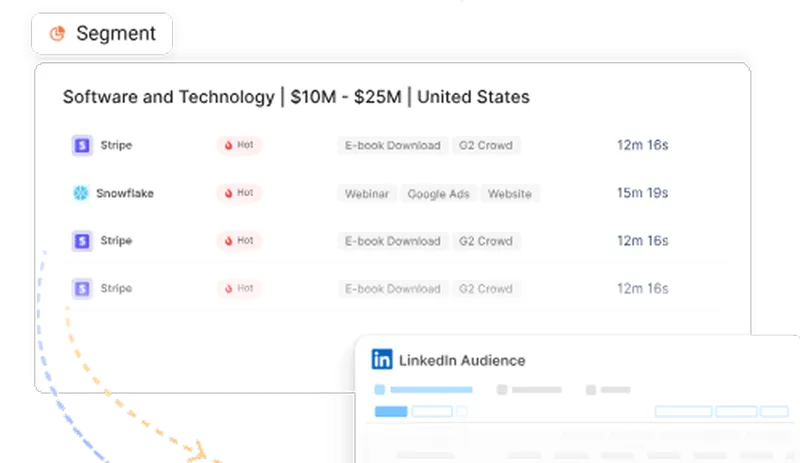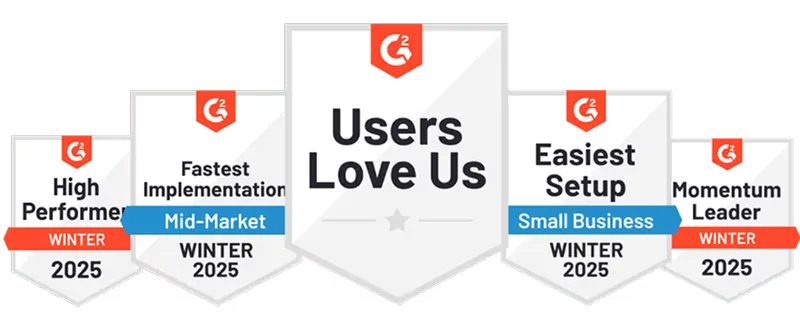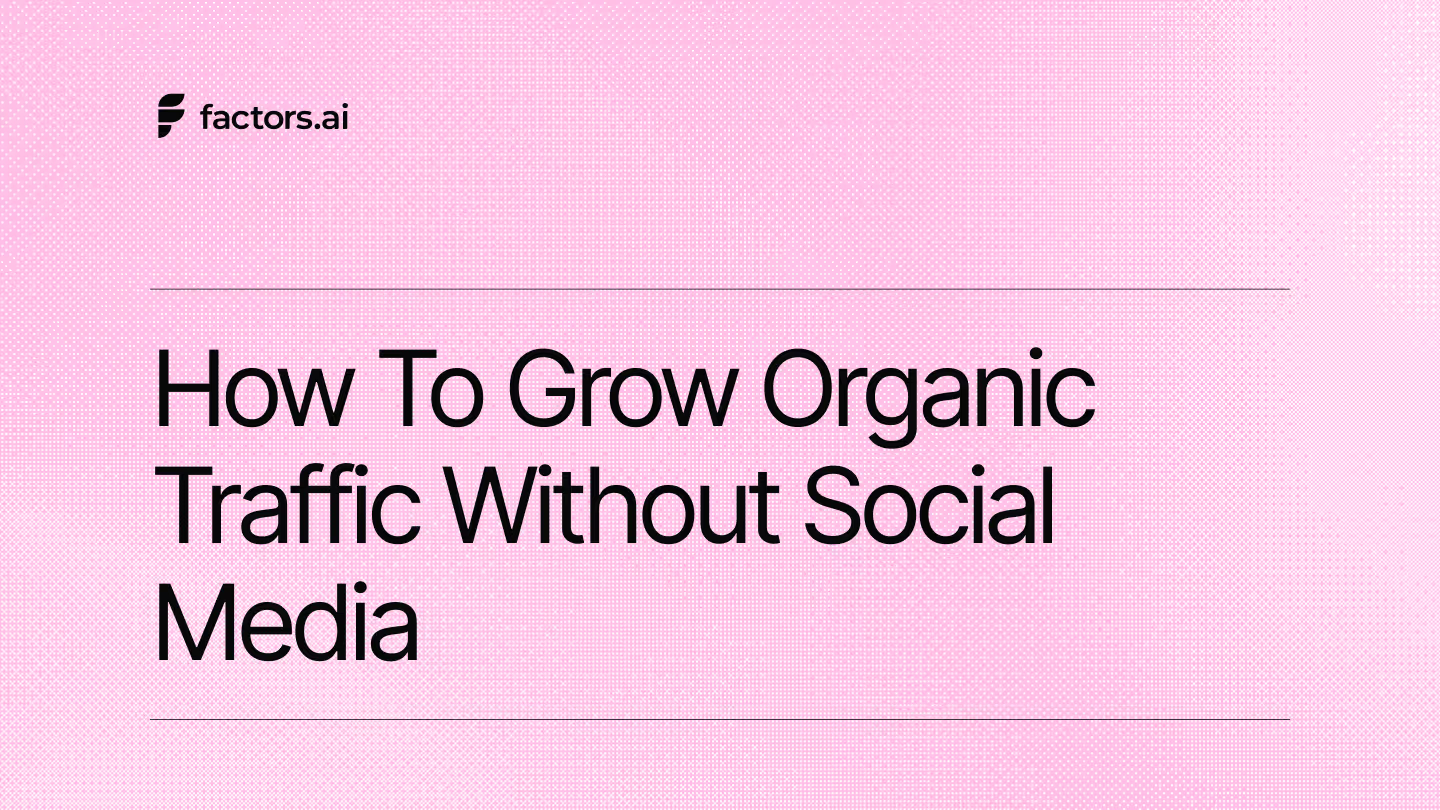6 Account-Based Marketing Tactics To Drive Conversions
Learn Top 6 Account-Based Marketing Tactics to Drive Conversions, including Personalized Landing Pages, Thought Leadership Webinars and Segmented Ads.
Are you generating lots of leads but not enough conversions? That’s the story of many startups as well.
Enter Account-based marketing — a strategic approach that personalizes marketing efforts for individual accounts to increase the likelihood of conversion.
In this guide, I'll share 6 battle-tested account-based marketing tactics that personalize marketing, and turn targeted accounts into happy customers, without draining your team.
We’ll cover tactics including:
- Building personalized landing pages addressing your ideal customer's pain points
- Small, industry-focused webinars to engage key accounts
- Tailored ads optimized for different buying stages
Let's dive into the ABM tactics that deliver real results.
6 account-based marketing tactics + examples
Here are 6 of our favorite ABM marketing tactics that businesses have seen great success with.
1. Personalized landing pages: A personal touch for your target accounts
Personalized landing pages speak directly to your target accounts, addressing their unique needs and pain points.
This isn't about simply changing the company or industry name on a generic landing page — it's about creating a tailored experience that resonates with your ideal customer profile.
Take Procurify, a Vancouver-based spend management company. They were in full-on growth mode, having secured Series B funding and expanded their teams. But with growth came increased pressure on the marketing team to accelerate customer acquisition.
Procurify's solution? An innovative strategy that involved creating 50 super-personalized landing pages that spoke to the exact needs of the industry they catered to.
The result — 38% overall demo rate, a testament to the power of personalization.

The key to Procurify's success was understanding their target accounts' needs. All the landing pages, though following a similar template, were unique in what they said. The copy spoke to only one person/industry and no one else. That’s what made this work.

But these pages also need to be seen by the right people. Procurify paired their landing pages with video ads, which had a cost-per-conversion that was just a quarter of their search ad spending.
The takeaway? Personalized landing pages can be powerful for your ABM toolkit.
2. Thought leadership webinars and roundtables: Engaging target accounts with industry insights
Webinars and roundtables are not new in the world of marketing. But when used in an ABM strategy, they can be a goldmine.
Inviting thought leaders from your target accounts to participate in these events helps you provide value to your audience and also build excellent relationships with key decision-makers.
A great example of this is the SaaS company, Outreach. They regularly host webinars featuring industry thought leaders.
This not only positions them as a knowledge hub in the industry but also allows them to engage with their target accounts on a deeper level.

For instance, they hosted a webinar titled "How to create and close more pipeline in 2023".
Here Andrew Arocha, CRO of Drift, and Melton Littlepage, CMO of Outreach jammed together on different tips and strategies to close more sales and improve team productivity.
The topic is a perfect audience merge of both businesses, helping them raise awareness of what they do—while connecting Outreach to Drift for future business opportunities.
How can you replicate this for your own ABM strategy? Here are a few steps:
- Identify the thought leaders in your target accounts
- Invite them to participate in a webinar or roundtable discussion
- Choose a topic that is relevant to your industry and your target accounts
- Promote the event to your target accounts and broader audience
- Follow up with participants after the event to continue the conversation
If you’re a smaller company, start with leaders that aren’t too popular. For example, connect with marketing heads instead of CMOs. They’re more accessible and can help you get started quicker.
3. Segmented ads: Tailored messaging for every buying stage
In the world of ABM, the more personalized your approach, the better your results. This is particularly true when it comes to advertising. Segmented ads, which are tailored based on the buying stage and industry of your target accounts, can significantly increase engagement and conversion rates.
One SaaS company that has successfully leveraged this tactic is DocuSign. As part of their ABM campaign, they targeted 450 accounts with different messaging, images, and calls to action, depending on the account's industry and stage in the buying cycle.

This highly personalized approach allowed them to speak directly to the needs and interests of each account, resulting in a more effective campaign.
Here’s one more example from Intridea – a full-service digital agency. They rented a billboard right across Ogilvy & Mathers’ office for some confrontational copy.

How can you replicate this in your own ABM strategy? Here are a few steps:
- Identify your target accounts and segment them based on industry and buying stage
- Develop different ad creatives and messaging for each segment and industry
- Use a platform like LinkedIn or Google Ads to create targeted messaging
- Monitor the performance of your ads and adjust them as needed
Segmented ads can be a powerful tool in your ABM strategy. By tailoring your ads to the specific needs and interests of each target account, you can increase engagement, improve conversion rates, and ultimately drive more revenue for your business.
4. Freebies: A win-win strategy for engagement
Everyone loves a good freebie, and your target accounts are no exception. Offering valuable resources like reports, templates, or even personalized gifts can be a great way to catch the attention of your target accounts and show them you're invested in their success.
One company that has leveraged this tactic to great effect is O2, a leading provider of mobile and broadband services in the UK.

A few years ago, O2 decided to raise its profile as a total communications provider in the B2B space. They created personalized, well-researched, value propositions that showed prospective targets how much they could save by switching to O2.
The results—impressive.
The campaign generated £260m in the pipeline and £39m in closed deals. The personalized reports were a key part of this success and helped the business gain access to accounts that otherwise did not convert.
So, how can you replicate this in your own ABM strategy? Here are a few steps:
- Identify the key decision-makers in your target accounts.
- Understand their needs and challenges.
- Create personalized freebies that address these needs. This could be anything from a valuable report or whitepaper to a product demo or a custom gift.
- Deliver these freebies through personalized ads or direct outreach.
- Follow up with the decision-makers to get their feedback and continue the conversation.
The success of O2's ABM campaign shows that freebies can be a powerful tactic in ABM, especially when they are personalized and provide real value to the target accounts.
So, the next time you're planning your ABM campaign, consider what kind of valuable freebies you could offer to your target accounts and allocate some resources to creating them.
5. Curated emails: Nurturing relationships with target accounts
Connecting with your dream accounts is all about relationship building. And email can be one of your best tools for nurturing those relationships. Instead of blasting generic emails to every account, get strategic with personalized outreach. Really get to know your target accounts—what makes them tick, what challenges they face, and what solutions they need.
Take Skill Share, the online learning platform, as an example. They could send generic course lists to every account. But, they choose to send carefully curated courses that are relevant to a user’s activity and choice of courses.

So, if a user shows interest in video production and editing courses, Skill Share curates a list of courses that are relevant. You can also take it one step ahead — design course pathways that help a user go from 0 to hero where you suggest the next best course automatically over email, when one is nearing its end.
If this is difficult to implement because of how your platform is built, segment your audiences based on the categories of content they consume and create personalized emails for each segment.
The takeaway? Don't just blast emails and hope for the best. Take the time to craft customized outreach that provides real value. That's how you make target accounts feel special - and turn them into loyal customers.
6. Visual social proof: Show, don't just tell
Visual social proof is a powerful way to showcase your company's success and the value you bring to your customers. This can take the form of case studies, customer testimonials, or even social media campaigns that highlight your company's achievements.
For instance, HubSpot, a leading marketing, sales, and service software, uses visual social proof on its homepage by showcasing its customers' logos. This gives potential customers a sense of trust and reliability, knowing that other reputable companies are using HubSpot's services.

Another great example is Ahrefs, an SEO tool, which uses visual testimonials from leading experts in the industry. This gives the company credibility and reassures potential customers about the quality of their product.

Visme, an infographic tool, shows the number of people using their tool around the world. This gives potential customers a sense of the tool's popularity and effectiveness.

Showcase the logos of some of your best clients. Talk about how your product has helped them grow. If you can, combine this with personalized landing pages and showcase industry-relevant logos on each page.
This helps build trust with your customers even before they have booked a demo call or talked to anyone from your team. After all, it’s not about telling your target accounts what you can do for them but showing them real, tangible proof of what you've already done for others.
Deliver a personalized marketing experience at every stage
Implementing these ABM tactics is only half the battle. To truly make the most of your ABM strategy, you need to know which accounts to target and which metrics to track.
Knowing which accounts to target helps you focus your resources on the accounts that are most likely to convert. This is possible with the help of account scoring. Account scoring, implemented right, can give you a clear picture of which clients you must target first and which ones can be deprioritized for better resource allocation.
You also need to be tracking the right metrics to measure the success of your ABM strategy and to make necessary adjustments. Some key metrics to track include engagement rate, conversion rate, and customer lifetime value. But remember, the metrics you choose to track should align with your overall business goals.
See how Factors can 2x your ROI
Boost your LinkedIn ROI in no time using data-driven insights


See Factors in action.
Schedule a personalized demo or sign up to get started for free
LinkedIn Marketing Partner
GDPR & SOC2 Type II
.svg)









